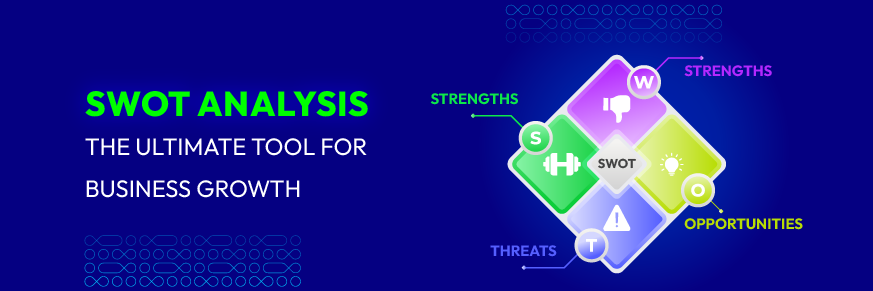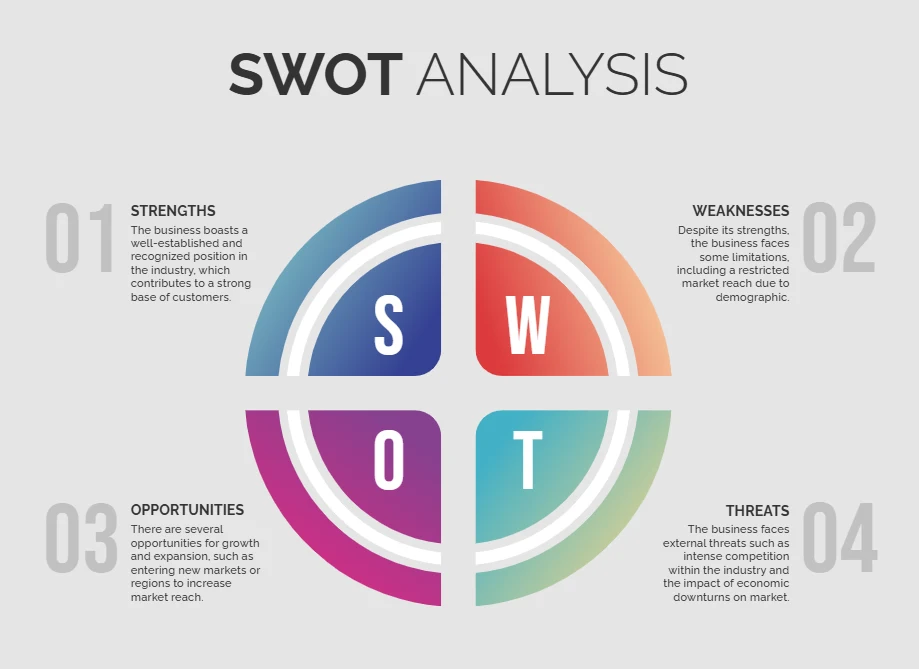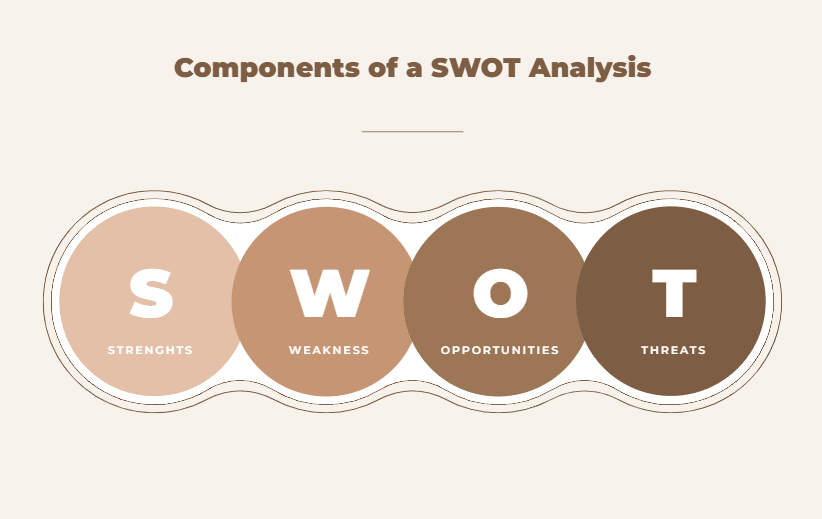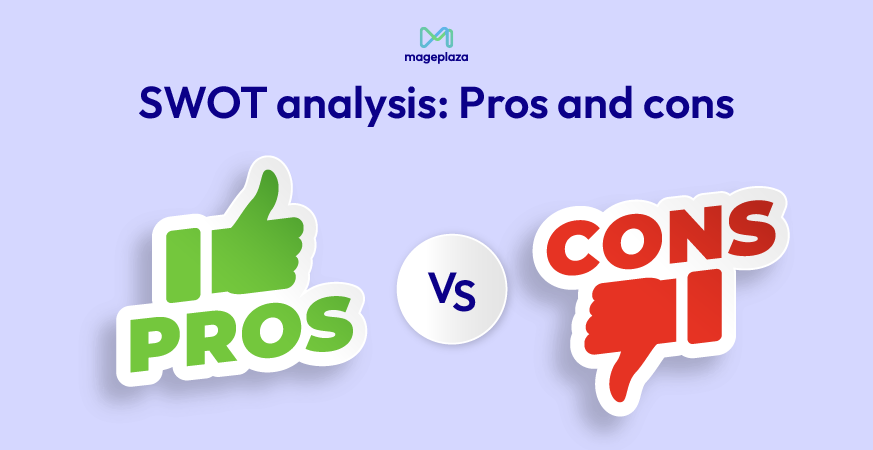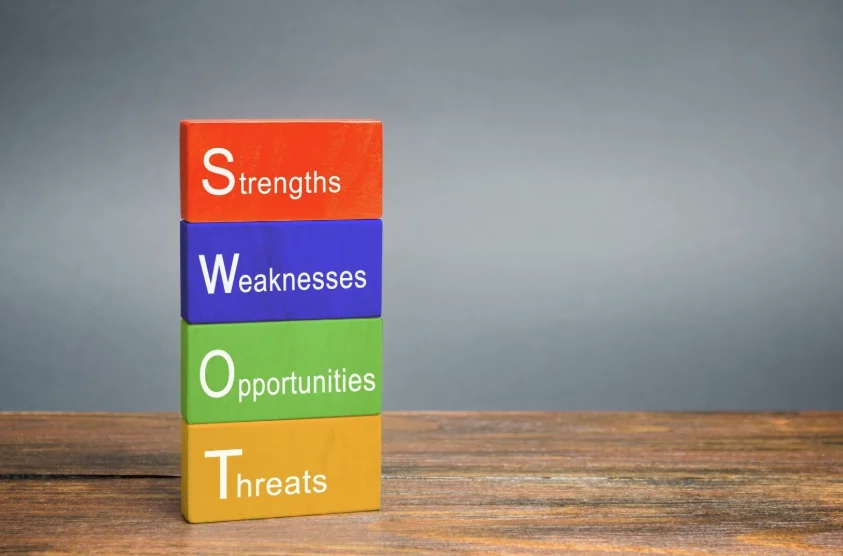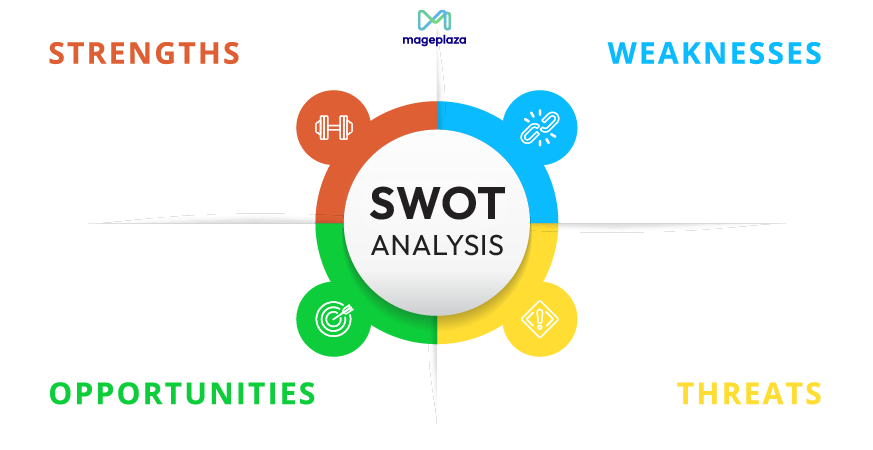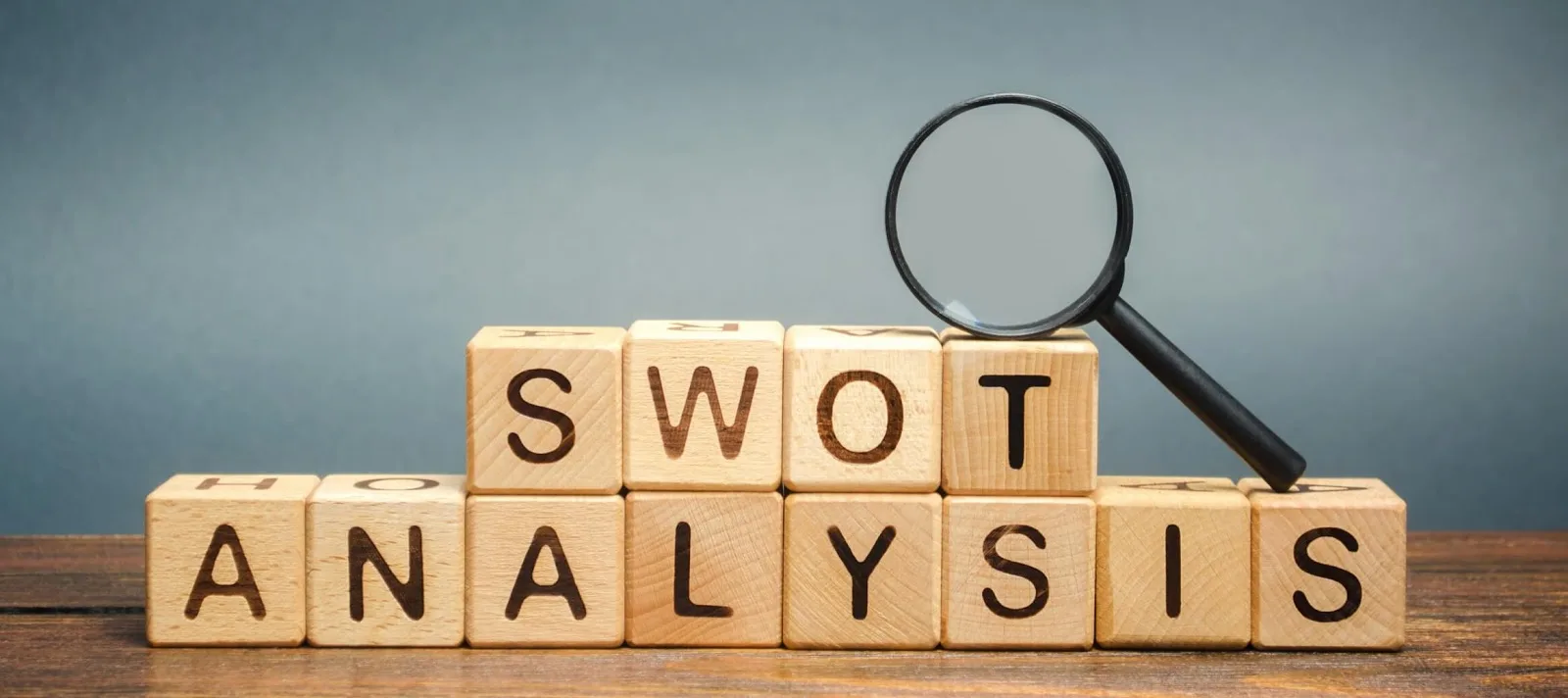Strategic planning is the cornerstone of every thriving business. Whether you’re launching a new product, expanding into new markets, or assessing operational challenges, understanding your strengths, weaknesses, opportunities, and threats (SWOT) can make all the difference. This blog dives deep into the concept of SWOT analysis, explaining its components, benefits, use cases, and actionable steps to help your business flourish.
What is a SWOT Analysis?

SWOT analysis is a simple yet powerful tool used to evaluate the internal and external factors influencing a business. It breaks down these factors into four key components:
- Strengths: Internal advantages that give your business a competitive edge.
- Weaknesses: Internal limitations that hinder performance.
- Opportunities: External conditions that can propel growth.
- Threats: External risks that could negatively impact operations.
By analyzing these elements, businesses gain a clearer understanding of their position in the market and can develop strategies for sustained growth and improvement.
Components of a SWOT Analysis
A SWOT analysis is divided into four components that provide a comprehensive evaluation of a business, project, or individual. These components are categorized into internal factors (Strengths and Weaknesses) and external factors (Opportunities and Threats).

Strengths
Strengths are internal factors that provide a competitive advantage or enhance the business’s position in the market.
Examples:
- A strong and recognizable brand.
- High customer loyalty or a large client base.
- Skilled and experienced workforce.
- Unique products, patents, or innovative technology.
- Efficient operational processes or cost advantages.
How to Leverage Strengths:
- Use your strengths to create unique selling points (USPs).
- Highlight them in marketing campaigns to attract and retain customers.
Weaknesses
Weaknesses are internal limitations or challenges that hinder performance and reduce competitiveness.
Examples:
- Limited financial resources or high operational costs.
- Inefficient supply chain or outdated technology.
- Lack of brand recognition or weak online presence.
- Gaps in employee skills or team cohesion.
How to Address Weaknesses:
- Identify and prioritize areas for improvement.
- Invest in technology, training, or marketing to close gaps.
- Focus on long-term solutions to mitigate recurring issues.
Opportunities
Opportunities are external factors that can positively impact the business, offering potential for growth or competitive advantage.
Examples:
- Emerging market trends or shifting customer preferences.
- Technological advancements that enhance efficiency.
- Partnerships, collaborations, or new distribution channels.
- Expansion into untapped markets or demographics.
How to Seize Opportunities:
- Act quickly to capitalize on favorable market conditions.
- Align your strengths to exploit identified opportunities.
- Develop new products or services that meet emerging needs.
Threats
Threats are external challenges that could harm the business’s operations, profitability, or market position.
Examples:
- Increased competition or new market entrants.
- Changing regulations or compliance requirements.
- Economic downturns or rising costs of raw materials.
- Shifts in consumer behavior or reduced demand.
How to Mitigate Threats:
- Develop contingency plans to address potential risks.
- Monitor market trends to adapt strategies proactively.
- Diversify suppliers, markets, or revenue streams to reduce dependency.
SWOT analysis: Pros and cons

SWOT analysis is a versatile and widely used tool for strategic planning. It provides a structured framework to evaluate internal and external factors affecting a business. However, like any tool, it has its advantages and limitations. Understanding the pros and cons of SWOT analysis will help you decide when and how to use it effectively for your business or project.
Here’s a detailed comparison of its strengths and weaknesses:
| Pros |
Cons |
| Cost-Effective: SWOT analysis is simple and inexpensive to conduct, making it accessible for small and large businesses alike. |
Resource Limitations: While inexpensive, a lack of expertise can lead to less accurate or actionable results. |
| Comprehensive View: Evaluate internal and external factors for a balanced approach. |
Difficulty in Prioritization: Does not provide a clear method for ranking or weighing identified factors. |
| Strategic Focus: Helps identify priorities and allocate resources effectively. |
No Action Plan: Provides insights but doesn’t offer specific solutions or strategies. |
| Flexible Application: Can be used across industries, projects, and organizational sizes. |
Static Nature: Needs regular updates to remain relevant in changing market conditions. |
| Encourages Collaboration: Involves multiple stakeholders, fostering diverse perspectives |
Difficulty Prioritizing: Lacks a structured method to rank identified factors. |
| Simple Framework: Easy to understand and apply, even for non-experts. |
Limited Scope: Doesn’t account for external macro-environmental factors (e.g., politics, culture). |
Internal and External Factors in SWOT

In a SWOT analysis, the factors are divided into internal and external categories as follows:
Internal Factors (Strengths and Weaknesses)
Internal factors are within the organization’s control and directly related to its operations, resources, and capabilities.
1. Strengths
- Human Resources: Skilled employees, strong leadership, or unique talent.
- Financial Position: Strong cash flow, profitability, or access to capital.
- Operational Efficiency: High productivity, advanced technology, or streamlined processes.
- Brand and Reputation: Recognized brand, customer loyalty, or positive public perception.
- Product/Service Quality: Unique offerings, patents, or superior features.
- Organizational Culture: Innovative environment, strong values, or employee satisfaction.
2. Weaknesses
- Financial Limitations: High debt, cash flow issues, or lack of funding.
- Skill Gaps: Lack of trained personnel or knowledge in key areas.
- Operational Inefficiencies: Outdated technology, high production costs, or poor logistics.
- Weak Brand: Lack of recognition or a tarnished reputation.
- Internal Challenges: Poor management, lack of direction, or organizational conflicts.
External Factors (Opportunities and Threats)
External factors arise from the environment in which the organization operates and are generally beyond its direct control.
3. Opportunities
- Market Trends: Growing demand, untapped markets, or changing customer preferences.
- **Technological Advancements: New tools, platforms, or processes that can be leveraged.
- Economic Conditions: Market growth, favorable economic policies, or trade agreements.
- Regulatory Changes: Relaxation of laws or supportive government policies.
- Partnerships and Alliances: Strategic collaborations or joint ventures.
- Competitor Weaknesses: Gaps in competitor offerings or operational issues.
4. Threats
- Market Competition: New entrants, aggressive competitors, or substitute products.
- Economic Downturns: Recessions, inflation, or currency fluctuations.
- Technological Disruption: Innovations that make current offerings obsolete.
- Regulatory Challenges: Stricter laws, compliance costs, or unfavorable policies.
- Social Changes: Shifting consumer behavior or negative public sentiment.
- Environmental Factors: Natural disasters, climate change, or resource scarcity.
By categorizing these factors, an organization can strategically plan its growth by leveraging its strengths, addressing weaknesses, seizing opportunities, and mitigating threats.
SWOT Analysis Chart
If you want to use SWOT analysis to evaluate and guide your business more easily, it’s essential to create a simple SWOT analysis chart. This chart offers a clear and organized way to capture and arrange your internal strengths and weaknesses, along with external opportunities and threats.

This chart serves as a helpful visual tool to make sense of the information gathered during your analysis. You can easily customize it and include it in any document you share with stakeholders.
However, remember that completing the SWOT chart is just one step in the process. When combined with a full market research kit, you’ll have all the tools needed to help your organization navigate new opportunities and challenges.
3 SWOT Analysis Examples
Here are three real-world examples of SWOT analyses for companies from different industries, highlighting the unique perspectives and strategies they employ:
1. Starbucks

Starbucks is a renowned global coffeehouse chain offering a diverse selection of coffee beverages, food items, and branded merchandise through an extensive network of stores worldwide.
Strengths:
- Strong global brand identity and a loyal customer base.
- Broad product portfolio extending beyond coffee, including food and merchandise.
Weaknesses:
- Premium pricing compared to competitors may deter cost-sensitive consumers.
- Vulnerable to fluctuations in coffee bean prices, which impact costs.
Opportunities:
- Expanding offerings to include more plant-based and healthier menu items.
- Investing in digital technology to enhance ordering processes and loyalty programs.
Threats:
- Intense competition from local cafes and major global chains.
- Shifting consumer trends toward more sustainable or health-conscious choices.
To mitigate challenges with pricing, Starbucks has focused on enriching customer experiences by enhancing its loyalty program and expanding globally. The introduction of plant-based and healthier food options aligns with evolving consumer preferences, addressing a key opportunity.
By prioritizing sustainability initiatives and adapting to market trends, Starbucks has strengthened its competitive edge. Its customer-focused approach and global expansion strategies ensure its continued leadership in the coffeehouse industry.
Google
Google is a technology giant and the global leader in search engine services, with a diverse portfolio that includes advertising, cloud computing, and hardware products.

Strengths:
- Dominance in the search engine market with over 90% global market share.
- Diverse ecosystem of products, including YouTube, Gmail, Google Ads, and Android.
- Strong focus on innovation through artificial intelligence and machine learning.
Weaknesses:
- Heavy reliance on advertising revenue for a significant portion of its income.
- Regulatory scrutiny over data privacy and antitrust concerns.
Opportunities:
- Expanding into emerging markets with growing internet penetration.
- Investing in AI, cloud computing, and hardware products to diversify revenue streams.
Threats:
- Intense competition from tech giants like Microsoft, Amazon, and Apple.
- Economic downturns reduce advertising budgets.
- Increasing public scrutiny over data collection and privacy practices.
Google’s strength in innovation and market dominance positions it as a tech leader. However, diversifying its revenue sources and addressing regulatory challenges will be essential for sustaining long-term growth in an increasingly competitive landscape.
3. Target

Target is a major retail corporation offering a wide range of products, including clothing, electronics, groceries, and home essentials, through its physical stores and e-commerce platforms.
Strengths:
- Strong presence in the retail industry with extensive store locations.
- Diverse product offerings that cater to various customer needs.
- Effective blending of in-store and online shopping experiences.
Weaknesses:
- Limited international presence compared to competitors like Walmart.
- Intense competition from both online retailers (e.g., Amazon) and brick-and-mortar stores.
Opportunities:
- Expanding operations and sales in international markets.
- Leveraging customer data to personalize shopping experiences and improve marketing strategies.
- Introducing more private-label products to increase profit margins.
Threats:
- Changing consumer shopping behaviors and preferences.
- Economic uncertainties that impact consumer spending.
- Pressure from competitors offering faster delivery or lower prices.
Key Insight:
Target continues to adapt to a competitive retail landscape by diversifying its offerings and leveraging digital solutions like curbside pickup and e-commerce. By enhancing its customer experience and expanding internationally, Target is well-positioned to sustain growth despite industry challenges.
How to Act on a SWOT Analysis

A SWOT analysis provides valuable insights into a company’s strengths, weaknesses, opportunities, and threats. Acting on it involves strategic planning and decision-making to capitalize on strengths, address weaknesses, leverage opportunities, and mitigate threats. Here’s how to act effectively:
1. Leverage Strengths
Action Steps:
- Identify areas where your strengths align with market demands.
- Focus on reinforcing what you already do well, such as brand reputation, customer loyalty, or operational efficiency.
- Use strengths to overcome external threats (e.g., competitive advantages in pricing or customer service).
Example:
A company with strong digital marketing capabilities can double down on targeted advertising to drive customer acquisition.
2. Address Weaknesses
Action Steps:
- Identify weaknesses that hinder growth and develop plans to improve.
- Allocate resources to strengthen areas like talent gaps, operational inefficiencies, or limited product offerings.
- Monitor progress with measurable objectives and timelines.
Example:
If a business struggles with customer service, investing in training programs or AI-based customer support tools can turn this weakness into a strength.
3. Capitalize on Opportunities
Action Steps:
- Prioritize opportunities that align with your strengths or address your weaknesses.
- Develop initiatives to expand into new markets, adopt emerging technologies, or respond to shifting consumer preferences.
- Stay agile and ready to adapt as opportunities evolve.
Example:
A retailer can capitalize on growing e-commerce trends by enhancing its online shopping platform and offering same-day delivery options.
4. Mitigate Threats
Action Steps:
- Develop contingency plans to address external risks like economic downturns, regulatory changes, or competitive pressures.
- Monitor industry trends and competitor strategies to stay ahead.
- Diversify products, services, or markets to reduce dependency on a single revenue stream.
Example:
- A business facing stiff competition might implement loyalty programs or competitive pricing strategies to retain customers.
-
5. Integrate SWOT Into Strategic Planning
- Use the SWOT findings to set clear, actionable goals for the business.
- Align the analysis with long-term objectives, ensuring it informs key decisions and initiatives.
- Regularly revisit the SWOT analysis to adapt to changes in the business environment.
10 Helpful Tips for SWOT Analysis
SWOT analysis is a basic tool that helps cover all the issues your business is currently facing to determine the future direction. Therefore, we offer you some helpful tips to make the analysis process easier and more successful when using SWOT for your business:
1. Be Specific and Objective
- Avoid vague statements; clearly define strengths, weaknesses, opportunities, and threats.
- Example: Instead of “Good marketing,” specify “Strong social media engagement with a 30% growth in followers over the past year.”
- Ensure your analysis is backed by data and facts to avoid biases.
2. Focus on Realistic Factors
- Identify factors that directly affect your organization and are actionable.
- Internal: Evaluate what your company controls, such as resources, processes, or capabilities.
- External: Consider external trends, market conditions, or competitor actions.
3. Prioritize Key Insights
- Not every factor is equally important. Prioritize based on impact and relevance to your goals.
- Highlight the most significant strengths and weaknesses to focus your strategy.
- Identify the most lucrative opportunities and pressing threats.
4. Involve a Diverse Team
- Include team members from different departments or roles for a broader perspective.
- For example, sales, marketing, operations, and customer service teams may all identify unique insights.
5. Use SWOT as a Starting Point
- Treat SWOT analysis as a foundation, not a final strategy.
- Develop actionable plans to address findings and integrate them into your business strategy.
6. Regularly Update Your SWOT
Revisit your SWOT analysis periodically to ensure it reflects current realities.
Markets and internal dynamics change; an outdated analysis may lead to ineffective strategies.
7. Leverage External Research
- Use external resources like industry reports, market data, or competitor analyses for accurate opportunities and threats.
- Example: Analyze emerging market trends or customer behavior to identify growth areas.
8. Balance Between Positive and Negative
- Avoid overemphasizing strengths or opportunities and neglecting weaknesses or threats.
A balanced view ensures realistic and practical decision-making.
9. Visualize Your Findings
- Use a clear and structured chart or grid to present your SWOT analysis.
- Example: A 2x2 matrix makes it easier to interpret insights and share with stakeholders.
10. Turn Analysis into Action
- Use your SWOT to define specific strategies.
- Example: Leverage strengths to seize opportunities and develop plans to address weaknesses and mitigate threats.
Bonus: Ask the Right Questions
- Strengths: What does our company do better than competitors? What resources do we excel in?
- Weaknesses: Where do we lack efficiency? What feedback do customers provide about our shortcomings?
- Opportunities: What trends can we capitalize on? Are there unmet needs in the market?
- Threats: Who are our biggest competitors? What external factors could disrupt our business?
Some situations where you should use SWOT analysis
A SWOT analysis is ideal for various situations, helping businesses make informed decisions. Here are key times to use it:
- Strategic Planning: Establish long-term goals and identify key factors affecting success.
- New Product or Service Launch: Assess strengths, weaknesses, opportunities, and threats for market entry.
- Market Expansion: Evaluate potential opportunities and risks in new regions or demographics.
- Competitive Analysis: Compare your business with competitors to identify advantages and gaps.
- Times of Change: Navigate economic shifts, industry disruptions, or organizational restructuring.
- Problem-Solving: Analyze internal and external causes of challenges and develop solutions.
- Resource Allocation: Prioritize investments or budget decisions based on internal capabilities and market needs.
- Startups: Understand market dynamics and define your value proposition during business planning.
- Mergers or Acquisitions: Evaluate compatibility and strategic fit for combined operations.
- Marketing Campaigns: Identify factors influencing campaign success and refine strategies.
Conclusion
A well-executed SWOT Analysis provides valuable insights into your business, helping you make informed decisions and set clear priorities. By leveraging your strengths, improving weaknesses, seizing opportunities, and mitigating threats, you can create a strategy that drives success and ensures long-term growth.
Whether you’re a small business or a global enterprise, regularly revisiting your SWOT Analysis keeps your plans adaptable in a constantly changing market. Use the insights from this blog to turn analysis into action and empower your business to achieve its full potential. Now is the time to apply SWOT Analysis and take the next step toward your goals.
